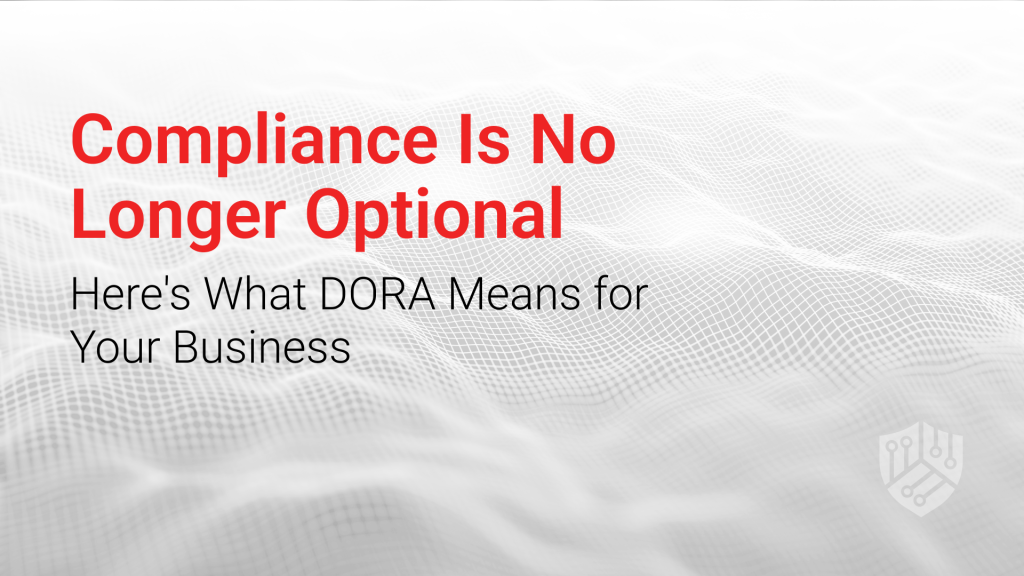July 18, 2025
Compliance Is No Longer Optional - Here's What DORA Means for Your Business

If you are running a financial business in the European Union, the Digital Operational Resilience Act (DORA) isn’t just another compliance checkbox. It is a complete game-changer in terms of cybersecurity and operational resilience. As the CyberFlow cybersecurity team has announced several times, DORA compliance has been mandatory since January 2025.
Any business that fails to comply faces significant penalties and operational disruptions. Understanding what this means for your organisation is crucial for maintaining business continuity.
Understanding DORA: A New Regulatory Reality
The digital operational resilience act summary offers a detailed framework for strengthening the cybersecurity posture of financial institutions across the EU. DORA represents the European Union’s response to increasing cyber threats targeting the financial sector.
Compliance with this regulation is compulsory for a broad range of companies:
- banks
- insurance companies
- investment firms
- payment institutions
- fintechs
- online trading platforms.
The regulation also includes all their third-party service providers. Thus, DORA’s scope extends beyond traditional financial institutions to include any entity that provides critical services to the financial sector.
Key Components of DORA Compliance Framework
The DORA compliance framework consists of five fundamental pillars that organisations must address to achieve full compliance.
1. Information and Communication Technology Risk Management
Companies must establish robust governance structures to manage technology risks. This includes:
- developing comprehensive risk management policies
- conducting regular risk assessments
- implementing appropriate controls to mitigate identified vulnerabilities.
According to the framework, businesses must:
- maintain detailed documentation of their IT&C systems
- understand their interdependencies
- establish clear accountability for risk management decisions at the executive level.
2. Incident Reporting and Response
DORA mandates strict incident reporting requirements with specific timelines and procedures. Companies must report significant cyber incidents to relevant authorities within prescribed timeframes, typically within 24 hours of detection. They must also notify any affected parties, such as clients whose data was exposed in the breach.
Moreover, businesses must have incident response capabilities that can effectively contain, investigate, and recover from cyber incidents while minimising operational disruption.
3. Digital Operational Resilience Testing
Regular testing of systems and processes is a cornerstone of DORA compliance requirements. CyberFlow can help you stay compliant by conducting various types of testing, including:
- vulnerability assessments
- penetration testing
- scenario-based exercises.
For larger financial institutions, advanced testing methods such as threat-led penetration testing may be required. These tests must be conducted by qualified professionals and documented thoroughly to demonstrate compliance.
4. Third-Party Risk Management
Modern financial services are extremely interconnected. Thus, DORA places significant emphasis on managing risks from third-party providers. Companies must:
- conduct thorough due diligence on service providers
- make clear contractual arrangements that address security requirements
- monitor third-party performance and security posture continuously
- create contingency plans for critical service provider failures
5. Information and Data Protection
Companies must implement comprehensive data protection measures that go beyond basic cybersecurity controls. This includes:
- encryption of sensitive data
- access controls
- regular security assessments.
The Business Impact of Non-Compliance
The consequences of failing to meet DORA compliance requirements extend far beyond financial penalties. Your company may face:
- operational disruptions
- reputational damage
- loss of customer trust.
The financial penalties themselves can be crippling, with fines reaching up to 2% of annual turnover for the most serious violations. However, the indirect costs of non-compliance – including business interruption and increased regulatory oversight – often prove even more damaging.
Building Long-Term Resilience
While achieving DORA compliance may seem challenging, the benefits for overall cybersecurity posture and operational resilience outweigh the efforts.
This regulation directs businesses to adopt a more holistic approach to risk management, moving beyond traditional cybersecurity measures to cross-border collaboration and involvement of all stakeholders.
Take Action Now with CyberFlow!
With DORA now in force for seven months, your company faces increasing regulatory pressure and potential penalties. Compliance is no longer an option – it is a must if you want to stay in business.
However, you are not alone in navigating DORA compliance requirements. CyberFlow can help you assess your current posture and develop a comprehensive compliance strategy tailored to your company’s needs.
Contact us before your company receives a formal request for proof of DORA compliance!
About Us
If you are interested on apply more security to your business contact us
